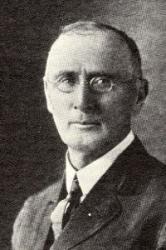1855 - 1930 Composer of "[When I can read my title clear]" in Singing by the Way (Rev. ed.) Blackmer, Francis Augustus. (Ware, Massachusetts, February 17, 1855--October 8, 1930, Somerville, Massachusetts). Advent Christian musician. His parents, Augustus and Jane Blackmer, were among those caught up in the excitement of the Millerite Movement. One son, Fred, became an Advent Christian minister. Francis, with a talent recognized at an early age, consecrated his own life to Christian service as a musician. He was immersed in baptism at the Adventist campmeeting in Springfield, Massachusetts, by Elder Miles Grant.
His early years were spend in central Massachusetts, his schooling at Wilbraham Academy. He was largely self-taught in harmony and musical composition. He wrote the words and music to his first gospel song, "Out on the fathomless sea," at the age of sixteen. Altogether he wrote over 300 gospel songs about the Second Coming, witnessing and working for the Lord, and praises to God's Holy Name. A few of these have circulated widely outside his own denomination. His final text, "I shall see him, And be like him," came when he was so weak that his friend, Clarence M. Seamans, had to supply the music. He used the pseudonym, A. Francis, with some of his early songs.
Blackmer's first anthology was The Gospel Awakening, (1888). Subsequent gospel songbooks with which he was associated were: Singing by the Way (1895), Carols of Hope (1906), The Golden Sheaf, No. 2 (1916), and Songs of Coming Glory (1926).
Most of his adult life was spent in Somerville, Massachusetts, a suburb of Boston, where he had a prosperous piano business. In the 1890s, his "Francis A. Blackmer Pianos" were made for him by the Washington Hall Piano Company of Boston. Later, his "Good as Gold Pianos" were manufactured by the Christman Piano Company of New York City and shipped directly to his customers throughout New England.
In Somerville, Blackmer served as choirmaster and song-leader in the Advent Christian Church for many years. He was also an elder of the church until his death. From 1914 until his death, he was songleader at the mid-summer Alton Bay Campmeeting on Lake Winnepesaukee, New Hapshire. There his High Rock Hill was both a salesroom and a summer cottage over the years. He was a member of the board of directors of the campmeeting association for several years. Very popular were his singing sessions on the campground square between suppertim and evening services, and a final sing into the small hours of the night following the final service of the campmeeting.
--Leonard Ellinwood, DNAH Archives
F. A. Blackmer
